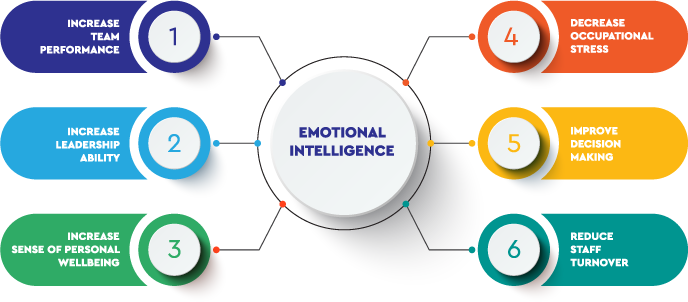What is the Enneagram?
Sometimes referred to as the GPS of human personality, the Enneagram is a framework to understand yourself and your colleagues better.
It is a precise, powerful tool to enhance all five elements of emotional intelligence, one of the biggest factors in determining effective work performance and overall ability to manage change, build resilience, and handle adversity.
The Enneagram describes nine basic worldviews and nine different ways of operating in the world. Each individual has an Enneagram primary type which is like their “default setting.”
This type describes a habit of attention, and the central question being asked to determine someone’s Enneagram type is:
“Where does your attention go?”
Each of the nine distinct habits of attention has its own natural gifts, areas of development, and blind spots. The Enneagram system offers a clear map to help each individual reach their maximum potential.
The Enneagram as a Tool for Developing Emotional Intelligence
The success of the Enneagram in the workplace is due to the fact it directly addresses all five elements of emotional intelligence: self-awareness, self regulation, internal motivation, empathy, and social skills.

- According to Forbes, 71% of hiring managers value emotional intelligence (EQ) over a high IQ.
- Another study found that employees are 400 percent less likely to leave their job if they have a manager with high emotional intelligence. (IRMI article)
- A study of over 72 companies including Best Buy, Daimler-Mitsubishi, Toyota and Avon found that using the Enneagram led to better communication and collaboration, rising sales, and increase in employee engagement1.
The Nine Enneagram Types – A Workplace Perspective
The first step to using the Enneagram is to discover your type. Below we offer a brief overview of the nine personality styles.

The Perfectionist/ Improver
Type 1 Perfectionist/Improvers are organized, detail-oriented, and efficient. They work hard to get things right. Their attention automatically goes to what needs improvement and correction.
Their superpower is to improve output, to maintain high standards in a work environment and find practical solutions to work-related problems. These are the detail-oriented people who create systems and structures to ensure quality, efficiency, and fairness throughout the organization. Type 1s keep us constantly improving.

The Helper/Giver
Type 2 Helpers/Givers are warm, concerned, nurturing, and sensitive to the needs, preferences and desires of the people around them. Their attention goes out to the needs of others but self-care can be difficult for them.
Their superpower is to boost team morale, provide broad support, improve office communication, and to create a positive work environment. Type 2s bring the human connection to the organization and help keep the workplace an enjoyable place to work. Type 2s help keep us connected to our humanity.

Achiever/Motivator
Type 3 Achievers/Motivators are energetic, optimistic, competitive, and goal-oriented. Their habit of attention goes to achievement and success.
Their superpower is winning and achieving. These are the goal-seeking sprinters of the Enneagram, aggressively working to succeed in their initiatives and beat the competition. Their eye on image keeps the company reputation in line. Type 3s drive us to achieve our initiatives.

The Individualist
Type 4 Individualists are intuitive, sensitive, and value individuality and authenticity. With high emotional fluency, their habit of attention goes to what is missing. They seek meaning in their work.
Their superpower is innovation, original expression, and to interpret the unspoken undercurrents in professional situations. Type 4s bring a remarkable perception to the workplace. Unafraid to think out of the box, they have a sixth sense for what is important but perhaps not being said. Type 4s help us hear the quiet undercurrents in the workplace.

The Investigator/Observer
Type 5 Observers/Thinkers/Investigators are reserved, curious, analytical, and insightful. Their habit of attention goes to guarding their resources (including time and energy).
Their superpower is clear, rational thought and deep focus. Type 5s bring the ability to stay steadily dedicated to complicated and thorny problems. This focus allows them to develop mastery of a topic, and Type 5s are often the subject matter experts in a business environment. Type 5s help us relentlessly pursue knowledge around our business issues.

The Loyalist/Skeptic
Type 6 Loyalists/Skeptics are responsible, reliable, and they value security and loyalty. Their habit of attention goes to what could go wrong or be a threat.
Their superpower is critical thinking and eliminating threats in the workplace. Type 6s bring a security-minded, problem-seeking perspective to the office. They focus on what could go wrong, what could be dangerous, and what could threaten the business. Type 6s help to keep us safe.

The Enthusiast
Type 7s are upbeat, fast-paced, curious, and place a lot of focus on enjoyment, being happy, and future planning. Their habit of attention goes to the positive, new, and exciting.
Their superpower is curiosity, lateral thinking, expansive vision, and an upbeat approach to work. Type 7s bring a boundary-free way of processing information that allows them to make original connections and come up with new ideas. Their focus on the positive and the possible makes them valuable for brainstorming, strategy, and vision. Type 7s help keep us expansive and growing.

The Leader/Challenger
Type 8s Leader/Challengers are blunt, direct, “what you see is what you get” people with forceful, big personalities. They have keen awareness of power dynamics: who is in control, who might need protection, who needs to be challenged. Their habit of attention goes to power and feeling in control.
Their superpower is decisive thinking, bold action, and a tenacity to get things over the finish line. Type 8s bring a direct, no-nonsense approach to the corporate environment and stay focused on actionable goals and initiatives. Their direct communication and “get things done” attitude makes them valuable in closing difficult deals and leading challenging projects. Type 8s help lead us through difficult issues.

The Peacemaker/Mediator
Type 9 Peacemaker/Meditators are naturally able to understand multiple perspectives and are accommodating, good listeners. With a habit of attention that goes to harmony, they have a mellow, go-with-the-flow attitude.
Their superpower is collaboration, mediation, and getting different perspectives to work harmoniously together. Type 9s bring a soothing, inclusive attitude to the workplace and can often be the glue of a team or office. These are the folks who get along with everyone. Their amiable, easy-going nature often de-escalates workplace conflicts. Type 9s help bring harmony to the office.
Learn more about the Enneagram.